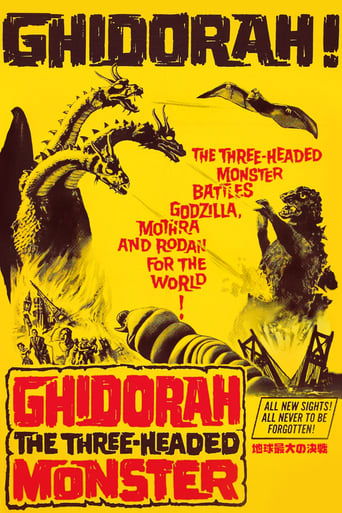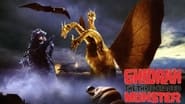jwmelvin-83959
This review is for the wide-screen Japanese english subtitled Ghidora The Three-Headed Monster, directed by Ishiro Honda, and a score by Akira Ifukube.This is a fun family film, and it offers a glimpse into what Japanese culture understood then, and what America has finally come to understand now. They are actors...so what if they are interacting with monsters?
You can read the plot synopsis on other reviews. The highlights of the film are the monsters of course. But the extreme camp that the plot involves, namely a conversation between Godzilla, Ronan, and little Mothra, is one of the memorable points. The film shows it extensively, giving the actors in the suits and the puppeteers plenty of screen time for us to enjoy the profound joy of this ridiculous situation. We are rewarded by seeing Rodan head-butt Ghidora, and Godzilla tail-tow Mothra up a hill. Godzilla 1954 was horrifying Nuclear allegory; Godzilla Vs. Mothra (1964) was fantasy. This is campy family joy.
But this is Kaiju at it's best. Notice the great cinematography, especially Ghidora approaching the arches.
The film also delivers a nice human subplot. A princess suffers from trauma and believes that she is a Venusian profit (in the American film it is changed to Martian). This role is played very strongly by Akiko Wakabayashi, who is better known as Aki from "You Only Live Twice". She posses well for the screen.
Since this is the early Bond era, the human plot involves an assignation attempt on our princess.But our Japanese police detective is a normal Joe, played by Yosuki Natsuki. And finally, the doctor who tries to help the Venutian Profit remember that she's a princess is played by the great Japanese actor Takashi Shimura. He was in the original Godzilla as Dr. Yamane, but is best known for his work with director Kurosawa. namely Seven Samurai, Ikura, and Rashomon. Damn, those are three of the best movies ever made.
Our movie allows our actors to actually act, even if only for a few minutes. The viewer does have to wait for a clumsy exposition, but when the movie gets going, it's a delight. It serves as an example on how to have a Kaiju be a satisfying viewing experience.
gavin6942
After a meteorite unleashes a three-headed beast upon Tokyo, Mothra tries to unite with Godzilla and Rodan to battle the extraterrestrial threat.This film has pretty decent effects, particularly during the "birth" of Ghidorah. It also happens to be pretty much the dividing point between the earlier, more serious films, and the later, more fun (and sometimes campy) versions of the monster that would become an international pop culture icon (if he had not already).As with other Godzilla releases, the David Kalat commentary is worth the price of the film. Not only is he informed, but he speaks fast, meaning you get about 180 minutes of information packed into 90 minutes of film. He also makes a good case for dubbing, while still expressing the preference for subtitles when critically analyzing a film.This film has received acclaim among many Godzilla fans and is considered to be one of the best Godzilla films of the Showa era. Reviewing the American version, Leonard Maltin gives the film two and a half stars, calling it "one of the better Toho monster rallies".
SnakesOnAnAfricanPlain
A meteorite from space lands in Japan. At about the same time Godzilla and Rodan also awaken to wreak some havoc. It soon transpires that the asteroid is Ghidrah, destroyer of planets, and a missing princess has had her body taken over by one of the last remaining Venusians. Eventually the humans must call on Mothra to convince Rodan and Godzilla to stop kicking rocks at each other and help save the planet. Same, same, but packs less of a punch. The main reason may be due to Ghidrah's origins. His three foes are all products of humanities mistakes regarding nuclear weaponry. Ghidrah is just a planet destroyer from space. You will enjoy this if you've seen the other films, and Godzilla and Rodan's quarreling is brilliantly comical. There's certainly more life in Godzilla's face than there has been before. Monster smack down time!
Josh Downham
Ghidorah: The Three-Headed Monster was a turning point in the Godzilla series. This is where the monster rumble was born. Godzilla, Mothra (in larvae form), and Rodan team up to battle a new monster named Ghidrah (or Ghidorah in the Japanese version). Ghidorah is an impressive beast - a colossal 3-headed dragon that spits yellow gravity beams. This is Rodan's first appearance since 1956. Unfortunately, the design of the suit was changed to look less menacing. This is when the series begins to gear towards children. Godzilla becomes a reluctant hero. In a rare instance of continuity in the series, Mothra vs. Godzilla is referenced. Invasion of the Astro-Monster (or Monster Zero) followed a year later and these 3 films really form a trilogy.The DVD includes both the Japanese and American versions of Ghidorah. The Japanese versions runs about 93 minutes and the English dubbed version runs about 85. This was the last Godzilla film to be extensively altered when brought to America. Both versions have their positives. Also included is an Image Gallery and Slide Show of movie posters, an Eiji Tsuburaya biography, and the original Japanese trailer.




